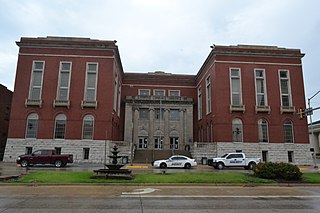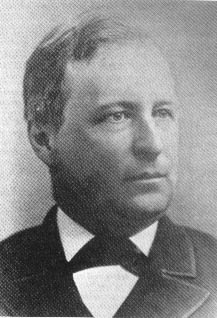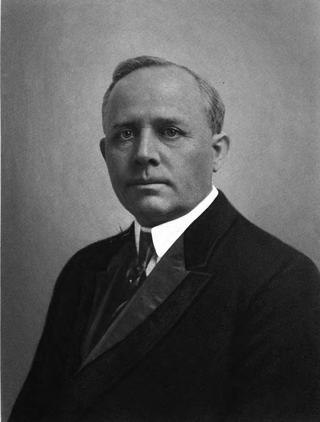
Pittsburg County is a county located in the U.S. state of Oklahoma. As of the 2020 census, the population was 43,773. Its county seat is McAlester. The county was formed from part of the Choctaw Nation in Indian Territory in 1907. County leaders believed that its coal production compared favorably with Pittsburgh, Pennsylvania at the time of statehood.

Latimer County is a county located in the southeastern part of the U.S. state of Oklahoma. Its county seat is Wilburton. As of the 2020 census, the population was 9,444. The county was created at statehood in 1907 and named for James L. Latimer, a delegate from Wilburton to the 1906 state Constitutional Convention. Prior to statehood, it had been for several decades part of Gaines County, Sugar Loaf County, and Wade County in the Choctaw Nation.

Lehigh is a city in Coal County, Oklahoma, United States. Its population was 356 at the 2010 census.
McCurtain is a town in Haskell County, Oklahoma, United States. The population was 357 at the 2020 census, a 30.8% decrease over the figure of 516 recorded in 2010. A coal mine disaster in 1912 killed 73 miners and ended McCurtain's prosperity. The mine explosion remains one of the worst disasters in Oklahoma history.

Haileyville is a city in Pittsburg County, Oklahoma, United States. The population was 716 at the time of the 2020 United States census.

Hartshorne is a city in Pittsburg County, Oklahoma, United States. It is the second largest city in the county. The population was 1,947 at the time of the 2020 United States census.

Krebs is a city in Pittsburg County, Oklahoma, United States. The population was 2,083 at the time of the 2020 United States census, up 1.5% from the 2,053 reported at the 2010 census, which in turn was a slight increase from the 2,051 reported in 2000. Its nickname is "Little Italy." Krebs was founded before Oklahoma statehood as a coal-mining town in the Choctaw Nation of Indian Territory.

McAlester is the county seat of Pittsburg County, Oklahoma. The population was 18,363 at the time of the 2010 census, a 3.4 percent increase from 17,783 at the 2000 census. The town gets its name from James Jackson McAlester, an early settler and businessman who later became lieutenant governor of Oklahoma. Known as "J. J.", McAlester married Rebecca Burney, the daughter of a full-blood Chickasaw family, which made him a citizen of the Chickasaw Nation.

The Reading Company was a Philadelphia-headquartered railroad that provided passenger and freight transport in eastern Pennsylvania and neighboring states from 1924 until its acquisition by Conrail in 1976.

Franklin Benjamin Gowen served as president of the Philadelphia and Reading Railroad, commonly referred to as the Reading Railroad, in the 1870s and 1880s. He is identified with the undercover infiltration and subsequent court prosecutions of Molly Maguires, mine workers, saloonkeepers and low-level local political figures who were tried for multiple acts of violence, including murder and attempted murder of coal mine operators, foremen, workers, and peace officers.
The Fort Smith and Western Railway was a railroad that operated in the states of Arkansas and Oklahoma.

George Frederick Baer was an American lawyer who was the President of the Philadelphia and Reading Railroad and spokesman for the owners during the Anthracite Coal Strike of 1902.
The Muskogee Company was a holding company based in Philadelphia. It was originally founded in Delaware on February 27, 1923. The company owned several railroads, which shipped oil and coal to western regions of the United States.

The Muskogee Roads was the colloquial name for a system of railroads under common management operationally headquartered in Muskogee, Oklahoma and controlled by the Muskogee Company of Philadelphia. The Muskogee Roads were the only Class I railroads to be headquartered in Oklahoma and had a major impact on the development and livelihood of the region.
The Choctaw, Oklahoma and Gulf Railroad (CO&G), known informally as the "Choctaw Route," was an American railroad in the states of Arkansas and Oklahoma.

Ralph Emerson Campbell was a United States district judge of the United States District Court for the Eastern District of Oklahoma.
Adamson is classified as a Census designated place per the GNIS.
Tobucksy County was a political subdivision of the Choctaw Nation in the Indian Territory, prior to Oklahoma becoming a state. It was part of the Moshulatubbee District, or First District, one of three administrative and judicial provinces.
The Poteau Valley Railroad was a shortline running from Calhoun, Oklahoma to Shady Point, Oklahoma, encompassing 7.883 mi (12.686 km) of track. It began in 1900 and was abandoned in 1926.
The Choctaw, Newcastle and Western Railroad (“CN&W”) was a shortline rail carrier in Oklahoma. It acquired its 3.3 mile line near Alderson, Oklahoma in 1907, and sold the trackage sometime in the 1919-1921 timeframe.









